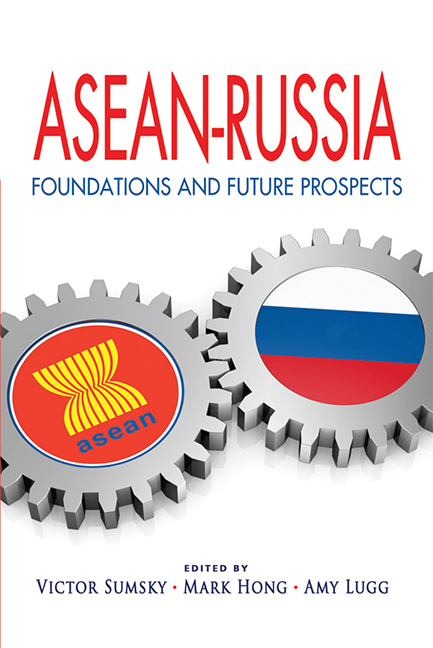Book contents
- Frontmatter
- Contents
- Foreword
- Preface
- About the Contributors
- Keynote Address
- Opening Remarks
- Keynote Address
- Introduction: Russia and the ASEAN Member States: Political and Economic Cooperation in Progress
- SECTION I WISEMEN'S VIEWS
- SECTION II GEOPOLITICS
- Russia in Southeast Asia: A New “Asian Moment”?
- ASEAN-Russia Military Ties: Reconfiguring Relations
- The Enlargement of the East Asia Summit: The Reasons and Implications of Bringing Russia In
- Russia's Entry into ASEM: Not Just a Courtesy Call?
- Russia-India-China: Acting in Concert in Southeast Asia?
- The South China Sea Issue: A View from Russia
- Southeast Asia and Russia: Forging a New Regional Architecture
- Russia-ASEAN Relations: An Indian Perspective
- SECTION III BILATERAL RELATIONS
- SECTION IV Business and Economics
- SECTION V CULTURE AND EDUCATION
- EPILOGUE
- Index
Russia-ASEAN Relations: An Indian Perspective
from SECTION II - GEOPOLITICS
Published online by Cambridge University Press: 21 October 2015
- Frontmatter
- Contents
- Foreword
- Preface
- About the Contributors
- Keynote Address
- Opening Remarks
- Keynote Address
- Introduction: Russia and the ASEAN Member States: Political and Economic Cooperation in Progress
- SECTION I WISEMEN'S VIEWS
- SECTION II GEOPOLITICS
- Russia in Southeast Asia: A New “Asian Moment”?
- ASEAN-Russia Military Ties: Reconfiguring Relations
- The Enlargement of the East Asia Summit: The Reasons and Implications of Bringing Russia In
- Russia's Entry into ASEM: Not Just a Courtesy Call?
- Russia-India-China: Acting in Concert in Southeast Asia?
- The South China Sea Issue: A View from Russia
- Southeast Asia and Russia: Forging a New Regional Architecture
- Russia-ASEAN Relations: An Indian Perspective
- SECTION III BILATERAL RELATIONS
- SECTION IV Business and Economics
- SECTION V CULTURE AND EDUCATION
- EPILOGUE
- Index
Summary
The twenty-first-century economic order is driven by globalization, which has had a profound impact on every country of the world, be it landlocked, coastal or adjoining the polar regions, resulting in greater access to global markets. Most countries are experiencing high growth rates largely driven by the burgeoning global trade and are highly dependent on the free flow of resources and goods to sustain their economy. In this globalization-led international order, the Asia-Pacific region has emerged as the most dynamic part of the world in economic and strategic terms. Both regional and extra regional powers are important stakeholders in global order, and their economic prosperity and security is intertwined with the regional economic and security environment.
These stakeholders are constantly engaged in formulating policies and developing strategies for greater engagement which manifests in the form of Free Trade Agreements (FTAs) to enhance trade and interdependence. In fact, economic diplomacy has emerged as an important tool for these states to harness the benefits of the current trends in globalization and keep their economies vibrant and competitive. Consequently, there is greater emphasis on trade and investments in the region.
At the strategic level, the Asia-Pacific region is under transformation. During the Cold War, geopolitical concerns and global rivalry between the U.S. and USSR had shaped the security dynamics in Asia. In the post-Cold War period, Asia is no longer divided along geopolitical and ideological lines, except in Korea. In fact there are more players in the region which would like to dominate the regional affairs. The Association of Southeast Asian Nations (ASEAN), China, India, Japan, Australia, the Republic of Korea, United States and Russia are at the forefront. In the evolving Asian balance of power, no country is willing to play second fiddle.
In the above context, Russia and ASEAN are important players in the evolving geopolitical and geostrategic developments in the Asia-Pacific region. This paper attempts to explore areas of cooperation between Russia and ASEAN countries. It begins by arguing that Russia is an Asia-Pacific power and an important player in the strategic and political dynamics of the region through its engagements in a host of Asia-Pacific related multilateral institutions and organizations.
- Type
- Chapter
- Information
- ASEAN-RussiaFoundations and Future Prospects, pp. 124 - 134Publisher: ISEAS–Yusof Ishak InstitutePrint publication year: 2012



